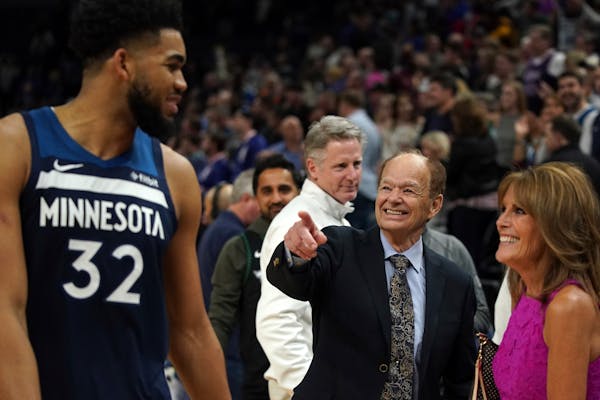 See
more of the story
See
more of the story
The 2021-22 season has been shaping up, for probably the last two years since Gersson Rosas took over as Timberwolves President and at least a year since a massive roster overhaul paired D'Angelo Russell with Karl-Anthony Towns, as a defining season in the franchise's trajectory.
While this year has been a huge disappointment in many ways — I don't think there's any way the Wolves envisioned they would have the league's worst record (14-42), or they wouldn't have traded away a lightly protected 2021 pick to Golden State — next season always seemed like the benchmark year by which the team needed to be competitive.
If the Wolves don't make the playoffs next season — or at least get VERY close while posting something around a .500 record in a competitive Western Conference — it's easy to envision Towns starting rumblings about wanting a trade with just two years left on his max deal after next season.
Russell's deal is even shorter: just one year remains after the 2021-22 season. And if next year doesn't work, why wouldn't the Wolves start over yet again with another rebuilding project — particularly if they could get a significant jump-start by maximizing Towns' trade value?
But if there was urgency already heading into next season, it perhaps gained another layer with the announcement of the sale of the team. Chris Hine and I talked about that point and more on Friday's Daily Delivery podcast.
If you don't see the podcast player, click here to listen.
While it's too simple to suggest that the success or failure of the Wolves in the short-term will have a huge influence over whether new owners Marc Lore and Alex Rodriguez are motivated to relocate the franchise, we also shouldn't just ignore its potential impact.
As the Wolves have skidded through almost exclusively losing seasons and various rebuilds since Kevin Garnett was traded in 2007, attendance at Target Center has followed. They were last in the NBA in attendance in 2019-20 at 15,066 per game.
With the exception of the season Jimmy Butler helped them to the playoffs in 2017-18, when they averaged north of 17,000 fans and had numerous sellouts, the Wolves have finished in the bottom five in the NBA in attendance every season since 2013-14.
And any momentum created by that one full season with Butler was eradicated quickly when he forced his way out via trade early the next year — the reverberations of which are still being felt, and coincidentally will offer another reminder when Butler's Heat visit Target Center on Friday night.
By way of comparison: The last franchise to relocate happened in 2008 when Seattle's Sonics were dragged to Oklahoma City. The Sonics had a loyal fan base but were playing in an aging arena and the team was mired in a slump.
They had made the postseason just once in the six seasons before the move, and attendance lagged. The Sonics were just 25th in attendance two years before the move and 28th the season before they left — owing in part of their arena's small-ish capacity of just over 17,000 but also to the team's on-court performance and the threat of possible relocation.
That's perhaps not a perfect apples to apples comparison to Minnesota — maybe a Granny Smith to a Honeycrisp — but this is the point: It becomes easier to think about moving a franchise when it isn't successful on the court or in the stands. It gives an owner the license to say, "This just isn't working, and I've tried all I can."
Conversely, more wins soon would create more energy and enthusiasm, which would lead to more fans in the stands in 2021-22, assuming NBA arenas are back to full capacity as they hope. There is a minor bottom line impact of a few thousand more fans per game. There is a greater perception impact — and less incentive for an owner to want to flee or the NBA to approve such a thing.
If major improvement and at least playoff contention doesn't happen next year? Like I said, the team could enter another rebuild by trading Towns and/or Russell, which would almost certainly lead to even less success in 2022-23. And by the time Lore and A-Rod took over full control in 2023, they could have greater justification for pursuing a new market.
That makes the next 16 games even more important as the Wolves evaluate what seems to be a promising connection on the court between Towns and Russell. It makes free agency and whatever happens in the draft lottery vital.
And it makes next season one that could define the Wolves' future not just for the next 3-5 years but forever.





